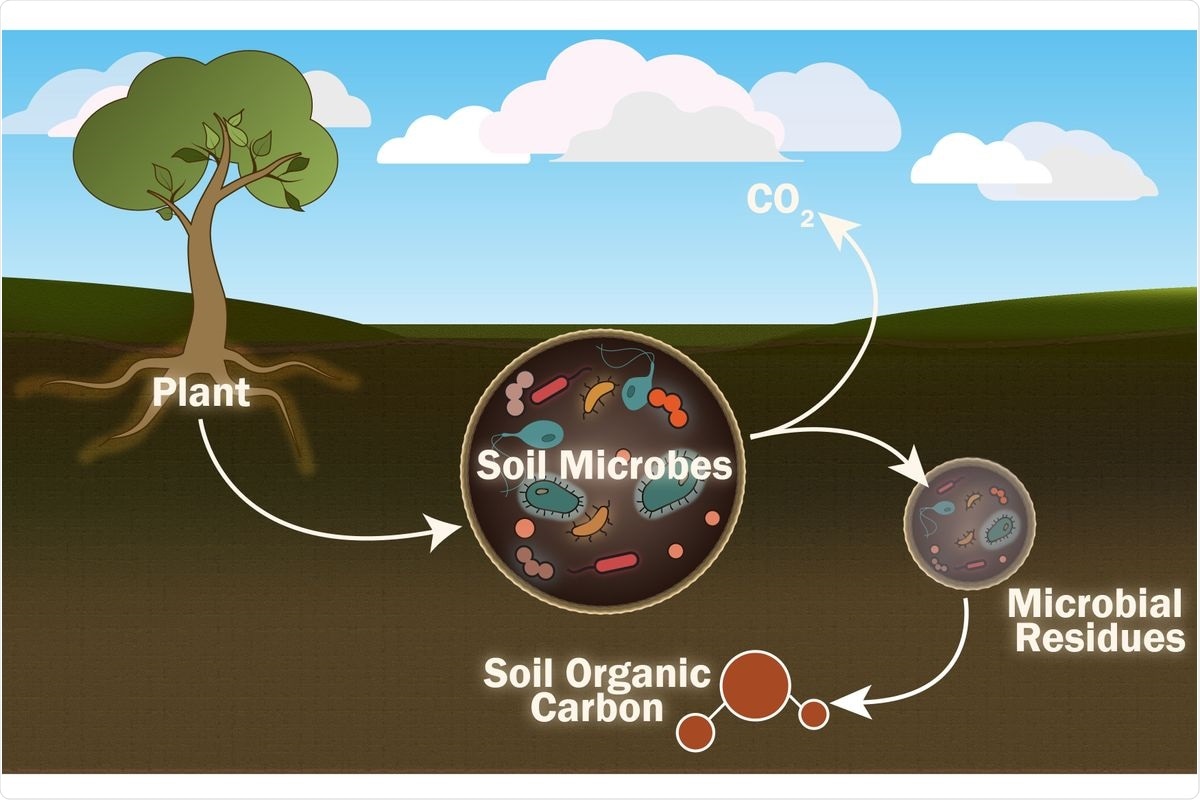Soil is a very complex ecosystem that is crucial to a healthy climate. It is one of the largest carbon repositories and home to billions of microorganisms.

Soil microbes transform carbon entering soil from plants, returning some to the atmosphere as carbon dioxide (CO2) and producing microbial residues that facilitate carbon sequestration in soil. These microbial activities influence ecosystem feedbacks to global change. Image Credit: Illustration/Chansotheary Dang.
Researchers at West Virginia University anticipate making more exact predictions concerning the role various soil microbes play in the carbon cycle as climate change continues to affect the Earth’s temperature and precipitation patterns.
Scientists have struggled for years to comprehend the ecology and function of soil microorganisms, given the diverse components of soil—organic matter, minerals, live organisms, gases, and water.
Ember Morrissey, associate professor of environmental microbiology, and Eddie Brzostek, associate professor of forest ecology and ecosystem modeling, are using a $756,318 grant from the National Science Foundation to determine which microorganisms consume major types of soil carbon and use the findings to accurately predict climate change.
Microbes are important for soil organic matter decomposition. They are the primary actors performing that process and, as a consequence, they play a big role in the global carbon cycle, returning carbon that enters the soil from above ground plant production to the atmosphere as carbon dioxide.”
Ember Morrissey, Associate Professor, Environmental Microbiology, West Virginia University
Morrissey used stable isotope probing, a sophisticated laboratory technique, to trace carbon uptake and characterize the function of microorganisms in their natural communities.
Historically, it’s been very challenging to understand what microbes are doing in soil and other natural systems because they’re so tiny and the communities are so diverse. And if you isolate them in the lab, the way they function in that artificial environment might not be the same as the way they function in their natural environment.”
Ember Morrissey, Associate Professor, Environmental Microbiology, West Virginia University
Researchers used stable isotope probing to add organic substrates like plant debris that contain an uncommon carbon isotope: C-13. The majority of carbon atoms are C-12, with six neutrons and six protons; however, C-13 has an additional neutron, making it heavier. This heavy C-13 is then found in the DNA of living soil microorganisms.
Researchers can however figure out which microbes are using different types of carbon in the soil and, hopefully, accurately predict how those mechanisms impact the climate.
We use mathematical equations to try to make projections of how changes in climate and changes in vegetation would impact how much carbon dioxide a forest or any ecosystem would store in its vegetation or in its soils. And for the longest time we were making those predictions without actually having equations that represented microbes.”
Eddie Brzostek, Associate Professor, Forest Ecology and Ecosystem Modeling, West Virginia University
Once Morrissey has figured out how individual microbes function in soil, Brzostek will be able to accurately predict how future climate change will affect carbon sequestration by ecosystems.
However, those forecasts have global implications.
“Countries all over the world rely on predictive models to determine by how much they need to reduce emissions to help keep Earth’s temperature within a certain range. Including microbes in the models will make the predictions more accurate,” concludes Brzostek.